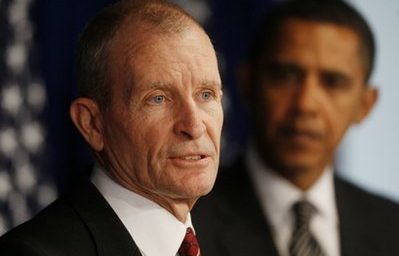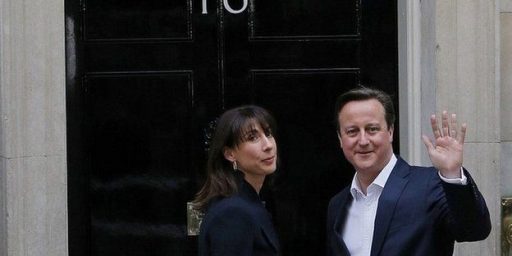Britain to Repeal Magna Carta
Tony Blair explains in a Sunday Times op-ed why basic liberties Englishmen have considered a birthright since Magna Carta are no longer convenient.
As for British nationals who pose a threat to us, we need to be able to monitor them carefully and limit their activities. It is true that the police and security services can engage in surveillance in any event. But this is incredibly time-consuming and expensive, and even with the huge investment we have made since 2001, they simply cannot do it for all suspects. Over the past five or six years, we have decided as a country that except in the most limited of ways, the threat to our public safety does not justify changing radically the legal basis on which we confront this extremism.
Their right to traditional civil liberties comes first. I believe this is a dangerous misjudgment. This extremism, operating the world over, is not like anything we have faced before. It needs to be confronted with every means at our disposal. Tougher laws in themselves help, but just as crucial is the signal they send out: that Britain is an inhospitable place to practise this extremism.
Times Political Editor David Cracknell adds more details:
NEW anti-terrorism laws are to be pushed through before Tony Blair leaves office giving “wartime” powers to the police to stop and question people. John Reid, the home secretary, who is also quitting next month, intends to extend Northern Ireland’s draconian police powers to interrogate individuals about who they are, where they have been and where they are going.
Under the new laws, police will not need to suspect that a crime has taken place and can use the power to gain information about “matters relevant” to terror investigations. If suspects fail to stop or refuse to answer questions, they could be charged with a criminal offence and fined up to £5,000. Police already have the power to stop and search people but they have no right to ask for their identity and movements.
No general police power to stop and question has ever been introduced in mainland Britain except during wartime. Civil liberties campaigners last night branded the proposed measures “one of the most significant moves on civil liberties since the second world war”.
Ironically, the stop and question power is soon to be repealed in Northern Ireland as part of the peace agreement. Home Office officials admitted, however, that the final wording of the new power to stop and question in the rest of the UK might have to include a requirement for reasonable suspicion.
Tim Worstall rightly sees movement closer to a police state:
There you are, amiably wandering down the street, and if a policeman so wishes, he can not only stop and search you, he can insist that you divulge where you have been and where you are going. If you have more than £1,000 in cash on you it can be confiscated, you having to prove where you got it from and what you were going to do with it: for the assumption is that such cash amounts are the proceeds or enablers of crime and so the burden of proof reverses. Finally, if you keep silent John Reid wants this to be taken as proof of your guilt.
It’s simply unfathomable. In a separate post, Worstall notes the sad irony that Blair is a “lawyer brought up in the legal system which first created all of these civil liberties in the first place.” Indeed.
Blair has been one of the most eloquent spokesmen for the need to fight back against the Islamist terrorist threat and he has taken reasonable steps to make it harder for them to foment violence in the UK. Denying visas to extremists and deporting aliens perceived to be a threat are well within the boundaries of what a free society may do to secure itself from harm. Giving police virtually unlimited discretion in harassing British nationals, however, takes a giant leap past undermining the very principles which make the U.K. worth saving to begin with.
Guy Herbert notes some eerie similarities with the excesses of colonialism and the Soviet constitution. It’s perhaps a bit unfair, as Blair’s motivations are much more laudable. Still, the similarities remain.





I, too, have some problems with all of this. That said, I wonder if James isn’t being overly dramatic, here.
I’d like to point out that the Magna Carta was written on a few assumptions; One of them being the assumption of a moral people being under it. And by moral, I mean in this case, a people all operating within the same moral sphere.
John Adams, famously pointed out about our own constitution:
This is most certainly a recognition on the part of atoms that our constitution could be used against us by those who were not limited by our morality.
I wonder if this situation is simply the result of a recognition that the Magna Carta was similarly restricted.
Are we, after all, talking about a set of principles which are ideally to be applied, or are we talking about a suicide pact?
I would like everyone to know this fact. TONY BLAIR IS SCOTTISH, NOT ENGLISH. Please do not be confused by his accent. My point being that he has no tradition of democracy ‘cos he’s a damned sweaty sock innit?
How many times have we in the US heard this exact same sentiment from the Republican party and supporters? Why is it ok from Bush, but wrong from Blair?
If it is true, as Bush says, that Al-Quida “hates freedom”, then this is another great victory for them, to go along with the many that Bush has given them.
Bush Derangement Syndrome knows no bounds, does it?
Bit,
Not sure what you mean, but Bush’s contempt for the constitution and the rule of law certainly seem to know no bounds.
And you claim my worldview is simplistic?
How much intelligence… how much thought does it take to continually spout “it’s all Bush’s fault”, as you’ve been doing?
bit,
OK,show me on place I have ever said “Its all Bush’s fault”. Even one.
I mean, is the only way you can debate is to make crap up? Guess so. Actually, if you look at the topic of this thread, it is Blair. And I am saying he handed the bad guys a victory.
Really dude, take that thinking cap out of cold storage.